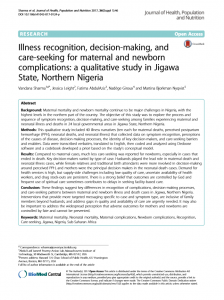
Maternal mortality and newborn mortality continue to be major challenges in Nigeria, with the highest levels in the northern part of the country. The objective of this study was to explore the process and sequence of symptom recognition, decision-making, and care-seeking among families experiencing maternal and neonatal illness and deaths in 24 local governmental areas in Jigawa State, Northern Nigeria.
This qualitative study included 40 illness narratives (ten each for maternal deaths, perceived postpartum hemorrhage (PPH), neonatal deaths, and neonatal illness) that collected data on symptom recognition, perceptions of the causes of disease, decision-making processes, the identity of key decision-makers, and care-seeking barriers and enablers. Data were transcribed verbatim, translated to English, then coded and analyzed using Dedoose software and a codebook developed a priori based on the study’s conceptual model.
These findings suggest key differences in recognition of complications, decision-making processes, and care-seeking patterns between maternal and newborn illness and death cases in Jigawa, Northern Nigeria. Interventions that provide more targeted messaging specific to case and symptom type, are inclusive of family members beyond husbands, and address gaps in quality and availability of care are urgently needed. It may also be important to address the widespread perception that adverse outcomes for mothers and newborns are controlled by fate and cannot be prevented.